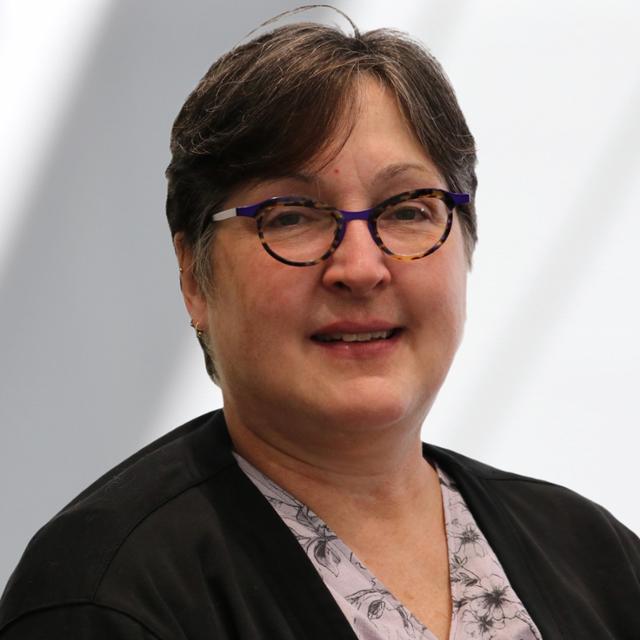Contact Information
Biography
Microbes are capable of a vast array of metabolic reactions, allowing them to use many different compounds as carbon and energy sources. This characteristic is exploited in bioremediation systems to enlist microbes in detoxifying contaminated industrial sites. We are using the passive remediation systems for abandoned coal mine drainage at Wingfield Pines, Lowber, Middle Branch and Boyce in Southwestern PA to study the quantity, types, and metabolic capabilities of the microbes present. Our goal is to determine which microbes are contributing to the contamination and which are helping in remediation so that we can help improve the efficiency and efficacy of the passive remediation systems.
Education
- Ph.D., Molecular Biology, Princeton University, 1988
- B.S., Microbiology, The Ohio State University, 1982
Research Interests
Bioremediation of Abandoned Coal Mines
Microbes are capable of a vast array of metabolic reactions, allowing them to grow on many different carbon and energy sources. These characteristics can be exploited by enlisting microbes to help in detoxifying contaminated abandoned industrial sites. Western Pennsylvania has an abundance of abandoned coalmines from subsurface bituminous coal field mining that has taken place over the last 250 years. Contaminated water leaches from many of the abandoned mines and finds its way into the local watersheds, leading to contamination of the watershed. One approach to preventing contamination is to route the mine effluent through a series of settling ponds before it is rerouted into the watershed. This approach was engineered at Wingfield Pines in Allegheny County, PA in 2009. Because the settling ponds are exposed to the environment, microbes, plants and animals quickly colonized them.
My lab is using the settling ponds at Wingfield Pines to study the quantity, types and metabolic capabilities of the microbes in each of the remediation ponds. It is known that microbes can both remediate toxic compounds and produce toxic compounds, depending upon which types are present. We have initiated a seasonal study of the individual settling ponds to measure water contamination levels and microbial communities (using NextGen sequencing). We will be examining the metatranscriptomics of the ponds to determine the metabolic capabilities of the bacterial communities that are present.
My lab is also using classical microbiology techniques to culture and study individual bacterial isolates from each pond, including sulfate oxidizing or reducing bacteria, slow growing bacteria and those with unique morphologies on solid surfaces. We are testing several designs of biochips to grow individual bacteria, as well as, bacterial communities in situ at Wingfield Pines.
I am using Wingfield Pines to bring novel research into an undergraduate lab course as part of the National Science Foundation funded Application-Based Service Learning STEM pedagogy that I have been developing. ABSL-based projects are being taught at six institutions across the northeast US, by 10 different faculty members.
ABSL uses a collaborative and integrated approach to teach scientific research skills to undergraduates in a course setting. Beginning with a community-based problem, students carry out service-learning to understand the problem and its impact on the community. The students apply the scientific method to study a research question posed by the community problem to better understand the problem or to help solve it. During the course of the novel research, students are taught technical writing, laboratory, problem-solving and critical-thinking skills. ABSL was chosen as a Science Education for New Civic Engagement and Responsibilities (SENCER) model course for 2010 and a featured project of the Critical Thinking Assessment Test in 2011 for our students' exceptional gains in critical thinking from a single course.
Profile Information
About
- BIOL373W Microbiology Superlab (using ABSL and novel research)
- BIOL319 General Microbiology (using a flipped classroom approach)
- BIOL398/399 Undergraduate Research
- Advanced Topics in Bioremediation
Valkanas, M.M., Rosso, T., Packard, J., Trun, N.J. (2021) Limited carbon sources prevent sulfate remediation in circumneutral abandoned mine drainage. FEMS Microbiology Ecology.
Truc Ly, Justin R. Wright, Nicholas Weit, Christopher J. McLimans, Nikea Ulrich1, Vasily Tokerev, Michelle M. Valkanas, Nancy Trun, Shawn Rummel, Christopher J. Grant, Regina Lamendella. (2019) Microbial Communities Associated with Passive Acidic Abandoned Coal Mine Remediation. Frontiers in Microbiology.
Valkanas, M.M. and Trun, N.J. (2018) A seasonal study of a passive abandoned coalmine drainage remediation system reveals three distinct zones of contaminant levels and microbial communities. Microbiology Open.


